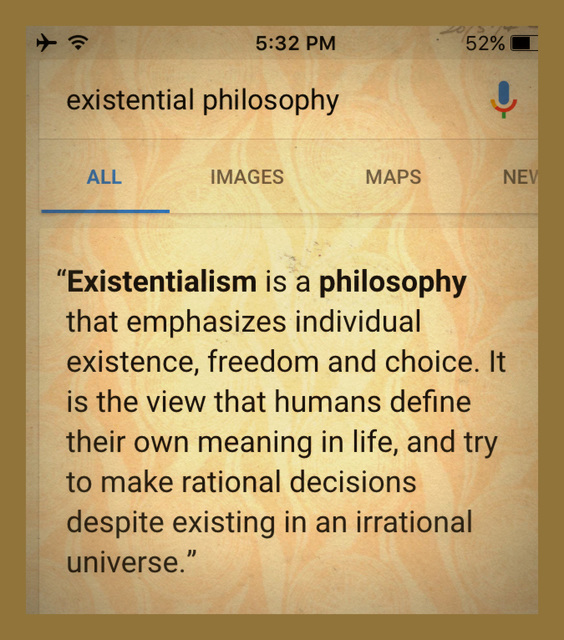Table 12.1 ~ Inflation
Leaves flutter
A sunny Autumn Day
Mushrooms
Perceiving a House *
A fence
Autumn
Circle closes
Autumn
Windy summer day
*
Anthropocene Sky *
Asian Brown Cl0ud
Colours
My window to the world
Yard next door
Phenomenology of Perception
So flows the current
Clinging
The God Species
Figure 7
The Ultimate Artifact / Rooms remember who we are
Cognitive dissonance
Walk in the park*
"Natural desire lines" and/or Culture*
A bumper sticker
*
Untitled
Keywords
Authorizations, license
-
Visible by: Everyone -
All rights reserved
- Photo replaced on 27 Oct 2016
-
260 visits
Existential Philosophy


Existential philosophy challenges the contention that philosophy is inherently high-flown; that the search for truth quires a turning away from the world of our concrete experience, as Plato's cave allegory would have us believe. It rejects the Platonic-Cartesian-Hegelian ideal of eternal truth or absolute knowledge on the one hand and, on the other, the positivist levelling which insists on objectivity and calculation. Contending that both approaches are abstract and inadequate for an understanding of our being-in-the-world, existentialist philosophy seeks to awaken us to an awareness of our fundamental involvement in a natural-cultural-historical milieu. It stresses that we are not neutral observers but rather, situated participants in an ongoing, open-ended, socio-historical drama. It claims that truth comes into being in our concrete co-existence with others and cannot be served from language and history. The existentialists declare that a non-situated human being is inconceivable, that the philosopher does not survey the world, and the philosophy is firmly rooted in a situation which has a historical depth. Far fom being the unfolding of absolute knowledge, 'philosophising starts with our situation' and attempts to illuminate it. The existentialist philosophers' central concern is to prompt humans not to live thoughtlessly but rather, to have a keen awareness of their freedom and responsibility in the shipping of a situation in which they are always already involved. ~ ix Preface
- Keyboard shortcuts:
Jump to top
RSS feed- Latest comments - Subscribe to the comment feeds of this photo
- ipernity © 2007-2024
- Help & Contact
|
Club news
|
About ipernity
|
History |
ipernity Club & Prices |
Guide of good conduct
Donate | Group guidelines | Privacy policy | Terms of use | Statutes | In memoria -
Facebook
Twitter

Sign-in to write a comment.